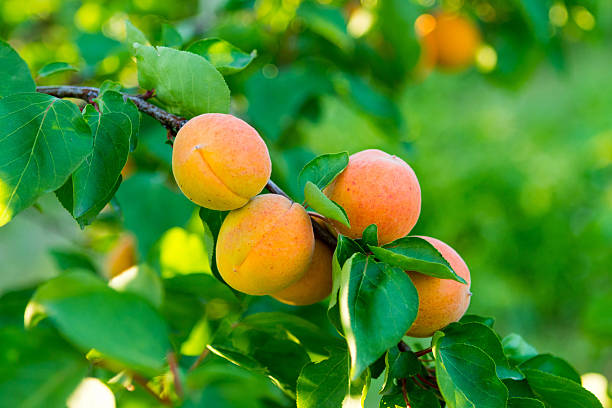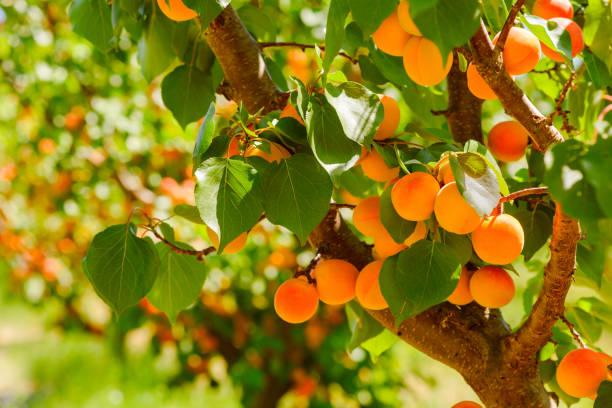When Is Apricot Season?
Apricot bear fruits as early as April and ends in September. Most fruit is ready to harvest in July and August. They flower from early February to April. The fruit grows from flowers that bees and other insects have pollinated. To help the tree focus its resources on producing larger, better-quality fruits, pickers thin the crop once it has started to grow. A single tree may produce fruit at different times depending on the year it receives pollen.
In some microclimates, the season can last as long as six weeks. However, most apricots are ready to eat by the second week of June. The time it takes for the fruit to ripen varies a little bit from variety to variety.

Table of Contents
How to Tell If Apricot is Ripe?
The best way to tell if a piece of stone fruit is ripe is to press about 14 to 12 inches from the stem gently. You’ll be fine as long as there’s some wiggle room. Peaches, nectarines, and avocados are good candidates for this method’s benefits. However, avoid squeezing the fruit! Activate its shoulder!
What Can You Make With Apricots?
Apricots are an awesome addition to your diet, and they can be used in a variety of recipes. They can be used in salads, as a meat substitute, or as a dessert ingredient. They can also be used in baking recipes, such as scones or muffins. Also, they’re a great source of vitamin A, which is essential for good vision and strong bones.
There are many different ways to use Apricots, so be sure to explore them!
Apricots are a great addition to any dish, and they can be used in a variety of ways. They can be used in desserts, such as apricot tart or a pudding, or savory dishes such as apricot lentil soup. They can also be used in salads, as a healthy replacement for cheese, and topping for bread or pies.
For example, if you want to make fruit kabobs, start by coating the apricots in coconut oil or vegetable oil. Then, grill over medium-high heat until lightly browned and slightly charred. Finally, add your choice of protein (chicken, beef, lamb, shrimp, etc.), and enjoy! They are versatile and delicious, making a great addition to any meal.

Apricot Health Benefit
Helps with Heart Health
Whether fresh or dried, Apricots contain soluble fiber, which is a fiber that draws water into the stool to aid in its passage through the digestive tract. Consuming 5 to 10 grams of soluble fiber per day can reduce LDL cholesterol (the “bad” cholesterol) by 11 points, if not more. Furthermore, the potassium in apricots aids in blood pressure reduction. In addition to the numerous anti-inflammatory polyphenols found in apricots, these two factors provide cardiovascular benefits.
Helps with Blood Sugar Control
Dried apricots are frequently consumed with nuts, such as in trail mixes. Because of their natural fat content, nuts slow the rate of gastric emptying and the release of glucose into the bloodstream. When nuts are combined with low-to-medium glycemic index dried fruits, such as apricots, blood sugar levels rise and fall more evenly. Eating dried apricots and nuts together can be a healthy snack for people trying to avoid blood sugar fluctuations.
Protects Eyesight
Like other orange fruits and vegetables such as carrots, pumpkin, and mango, Apricots get their vibrant color from beta-carotene. Beta-carotene is a vitamin A derivative linked to the prevention of age-related macular degeneration. It’s is a condition that can cause vision loss over time. Consuming beta-carotene-rich fruits and vegetables regularly may help protect against the disease.
Could Lower the Risk of Neurodegenerative Diseases
Many fruits, including apricots, contain the flavonoid quercetin. Rutin, a component of quercetin, effectively prevents neurodegenerative diseases such as Huntington’s, Alzheimer’s, Parkinson’s and are a group of neurodegenerative disorders.
A lot of research is still necessary, but eating more apricots may help lessen the severity of some neurological conditions. They can up-regulate good genes and down-regulate bad genes, cut down on proinflammatory cytokines, and boost antioxidant activity.
Could Aid in Cancer Prevention
Apricots contain antioxidant phytonutrients such as polyphenols, flavonoids, and beta-carotene. These can shield your cells from the daily damage that can lead to cancer in the long run. It’s no secret that eating a healthy diet can help prevent cancer. Apricots are an excellent addition to an antioxidant-rich diet.
